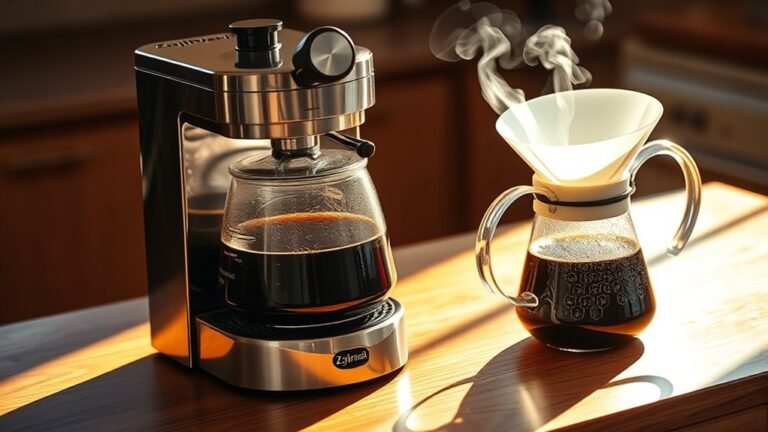The Best Decaf Coffee for French Press
If you want the best decaf coffee for French press, focus on high-quality Arabica beans processed with the Swiss Water or CO2 method to preserve flavor. Choose a coarse, consistent grind from a burr grinder to avoid over-extraction and sediment. Brew at 195-205°F, steeping for about four minutes with a 1:15 coffee-to-water ratio for balanced extraction. Proper storage in sealed, opaque containers also preserves freshness. You’ll find more on refining your choice and technique ahead.
How Decaf Coffee Is Made

Although decaf coffee retains much of the original coffee bean’s flavor, the process of removing caffeine involves several precise methods, each designed to minimize flavor loss while extracting the caffeine efficiently. You’ll encounter key decaf production methods like the Swiss Water Process, which uses water and osmosis to selectively remove caffeine without chemicals. Another common caffeine removal technique is the Direct Solvent Process, where coffee beans are steamed, then treated with solvents like methylene chloride or ethyl acetate to extract caffeine. Additionally, the Carbon Dioxide Process employs pressurized CO2 to dissolve and remove caffeine selectively. These caffeine removal techniques aim to preserve the structural integrity and aromatic compounds of the beans, ensuring your freedom to enjoy decaf coffee that closely mirrors the flavor profile of its caffeinated counterpart.
Why Choose Decaf for French Press Brewing
When you choose decaf for French press brewing, you preserve nuanced flavor profiles often diminished by caffeine removal. Decaf beans respond differently to brewing temperature, requiring precise control to avoid bitterness. Additionally, the natural oils extracted during steeping enhance mouthfeel and aroma, making decaf an excellent match for this method.
Flavor Profile Retention
Because French press brewing allows coffee grounds to steep directly in water, it preserves a broader range of flavor compounds compared to other methods. When you use decaf coffee with this technique, you benefit from enhanced flavor intensity and superior aroma preservation. Decaffeination can sometimes diminish these characteristics, but the immersion process of the French press counteracts this by extracting oils and soluble solids more thoroughly. This means you’ll experience a fuller, richer cup that maintains the complex notes typical of high-quality beans. By choosing decaf specifically processed to retain its flavor profile, you guarantee your brew doesn’t sacrifice taste for caffeine removal. Ultimately, the French press lets you enjoy decaf coffee without compromising on the sensory experience that defines your coffee ritual.
Brewing Temperature Sensitivity
Brewing temperature plays a critical role in extracting the ideal flavor from coffee, and decaf beans exhibit distinct sensitivity to temperature variations during French press brewing. You’ll find that decaf’s altered chemical structure demands precise temperature control to avoid over-extraction or under-extraction. Temperatures between 195°F and 205°F are generally best, but slight adjustments can greatly impact bitterness and acidity. Coupled with brewing time, usually around four minutes, maintaining consistent temperature guarantees balanced solubles extraction. Lower temperatures may result in a weak, flat cup, while higher ones risk extracting undesirable compounds. By mastering temperature control, you gain freedom to highlight decaf’s subtle nuances, making French press brewing a uniquely rewarding experience. This technical understanding empowers you to tweak variables confidently for a perfect decaf brew every time.
Oil Extraction Benefits
Oil extraction plays an essential role in defining the flavor profile and mouthfeel of French press coffee, and decaf beans offer unique advantages in this process. When you brew with decaf, the oil extraction is often more pronounced because the decaffeination process alters the bean’s cellular structure, allowing oils to release more readily during steeping. This enhanced oil extraction contributes to a richer body and more nuanced flavor enhancement, compensating for the absence of caffeine’s bitterness. By choosing decaf for French press brewing, you’re optimizing the extraction of aromatic compounds and lipids that elevate the sensory experience. This means you can enjoy a full-bodied, smooth cup without sacrificing complexity, granting you the freedom to savor coffee on your terms while maximizing the benefits of oil extraction.
Key Factors for Selecting Decaf Coffee Beans
When selecting decaf coffee beans for your French press, you’ll want to contemplate the bean’s origin, as regional soil composition and climate greatly influence flavor profiles. Additionally, the roast level affects extraction rates and taste balance, with lighter roasts preserving acidity and darker roasts enhancing body. Understanding these factors helps you optimize the brewing process for a richer, more nuanced cup.
Bean Origin Impact
Three primary factors tied to bean origin greatly influence the flavor profile and quality of decaf coffee suitable for French press brewing. First, bean varieties determine inherent chemical compositions, affecting acidity, body, and aromatic compounds. Arabica beans, for example, typically offer nuanced floral and fruity notes, while Robusta imparts bitterness and heavier body. Second, regional profiles shape these varieties through soil composition, altitude, and climate, which modify bean density and sugar content. Ethiopian beans often present bright, citrusy characteristics, while Colombian beans lean toward balanced, chocolatey tones. Finally, processing methods at origin—wet or dry—further impact clarity and mouthfeel. Understanding these factors lets you select decaf beans that maintain complexity after decaffeination, ensuring a rich, satisfying French press cup that aligns with your personal taste freedom.
Roast Level Effects
Selecting the ideal roast level is essential for decaf coffee beans, as it directly influences flavor balance, extraction consistency, and overall cup quality in a French press. You’ll find that lighter roasts preserve more of the bean’s inherent acidity and nuanced decaf flavor, but may extract less evenly in the press, risking sour or grassy notes. Medium roasts strike a balance, enhancing sweetness and body while maintaining clarity. Dark roasts emphasize roast impact, imparting smoky, bitter tones that can mask subtle decaf characteristics but yield a fuller mouthfeel and smoother extraction. Understanding these roast impact dynamics helps you choose beans that complement your French press technique, ensuring the decaf flavor remains vibrant without sacrificing extraction quality or freedom of taste preference.
Top-Rated Decaf Coffee Brands for French Press
Choosing the right decaf coffee for your French press involves understanding how bean origin, roast level, and decaffeination method affect flavor extraction and brew quality. Top-rated decaf blends like Kicking Horse’s Decaf Dark and Peet’s Decaf Major Dickason’s offer robust flavor nuances essential for full-bodied French press brews. Swiss Water Process decafs retain complex profiles without chemical residues, enhancing clarity and richness. Brands such as Stumptown and Volcanica Coffee emphasize single-origin decafs, providing distinct regional notes that shine through in immersion brewing. When selecting, consider how each brand’s decaf blend balances acidity, sweetness, and mouthfeel, ensuring your French press yields a satisfying cup. These options empower you to enjoy freedom from caffeine while preserving the sensory depth you expect from quality coffee.
Grinding Tips for Decaf Coffee in French Press

Understanding the characteristics of your decaf coffee beans sets the stage for optimizing your grind size, which directly impacts extraction in a French press. You’ll want a coarse grind size to prevent over-extraction and sediment in your cup. Achieving uniform grind consistency is vital; uneven particles can lead to a bitter or weak brew. Using a burr grinder rather than a blade grinder guarantees precise control over grind size and consistency, giving you freedom to dial in the perfect texture. Avoid grinding too fine, as it clogs the mesh filter and disrupts steeping. Regular calibration of your grinder helps maintain consistent particle size, which is fundamental since decaf beans often have slightly different density than regular beans. By mastering these grinding tips, you reveal the full potential of your decaf French press experience.
Brewing Techniques to Enhance Decaf Flavor
Although decaf coffee often has a subtler flavor profile than regular coffee, you can greatly enhance its taste by refining your brewing techniques. Start by controlling water temperature—aim for 195-205°F to optimize flavor extraction without bitterness. Use a coarse, consistent grind to guarantee even saturation and prevent over-extraction. When steeping in your French press, allow 4 minutes for full flavor development, adjusting slightly based on your bean’s characteristics. Stir gently after adding water to evenly distribute grounds and release aromatic compounds. Avoid plunging too quickly; a slow, steady press minimizes sediment and bitterness. Experimenting with brew ratios, typically 1:15 coffee to water, lets you tailor strength and richness. These precise brewing methods focus on flavor enhancement, empowering you to access decaf’s full potential without compromising your freedom to customize.
Storing Decaf Coffee to Maintain Freshness
Proper storage is essential to preserving the delicate flavors and aromas of decaf coffee. To maintain freshness, you need to minimize exposure to air, moisture, heat, and light, all of which accelerate flavor degradation. Using vacuum sealing or airtight containers is highly effective in creating a controlled environment. Here’s what you should focus on:
- Use vacuum sealing to remove oxygen and extend shelf life.
- Store coffee in opaque, airtight containers to block light and air.
- Keep your coffee in a cool, dry place away from heat sources.
- Avoid frequent opening of containers to reduce moisture exposure.
- Divide large batches into smaller portions to limit repeated air contact.
Frequently Asked Questions
Can Decaf Coffee Cause Caffeine Withdrawal Symptoms?
If you’re sensitive to caffeine, you might wonder if decaf coffee can cause withdrawal effects. Decaf still contains small caffeine amounts, so if you consume it regularly and suddenly stop, mild withdrawal symptoms like headaches or irritability could occur. However, these effects are typically less intense than with regular coffee. Your caffeine sensitivity plays a key role in how noticeable withdrawal might be, so it varies from person to person.
Is Decaf Coffee Safe During Pregnancy?
When you’re choosing what to drink during pregnancy, balancing safety, nutrition, and enjoyment matters. Decaf coffee offers decaf benefits by greatly reducing caffeine intake, aligning with pregnancy guidelines that recommend limiting caffeine to under 200 mg daily. While decaf isn’t completely caffeine-free, its minimal caffeine content makes it generally safe in moderation. You can enjoy the flavor and ritual without risking excessive caffeine, supporting your freedom to savor coffee responsibly during pregnancy.
How Does Decaf Coffee Affect Sleep Quality?
When you drink decaf coffee, the reduced decaf caffeine content generally has a minimal impact on your sleep patterns compared to regular coffee. While not entirely caffeine-free, decaf contains about 97% less caffeine, so it’s less likely to disrupt your ability to fall asleep or reduce sleep quality. However, individual sensitivity varies, so if you’re particularly caffeine-sensitive, even decaf might slightly affect your sleep patterns.
Are There Health Benefits Unique to Decaf Coffee?
Like a hidden gem, decaf coffee offers antioxidant properties that can benefit your health without caffeine’s buzz. You’ll find that decaf supports heart health by reducing inflammation and oxidative stress, which are key factors in cardiovascular disease. While it lacks caffeine’s stimulant effects, decaf still delivers valuable polyphenols, helping protect your arteries and improve blood vessel function. So, if you want freedom from caffeine but not from health perks, decaf’s a smart choice.
Can French Press Affect the Acidity of Decaf Coffee?
Yes, French press extraction can influence acidity levels in your decaf coffee. Since the French press uses full immersion brewing, it extracts a broader range of compounds, including acids, compared to drip methods. This means you might notice a fuller, sometimes brighter acidity, depending on grind size and steep time. Adjusting these variables lets you control how acidic your cup tastes, giving you freedom to tailor your decaf experience precisely.






